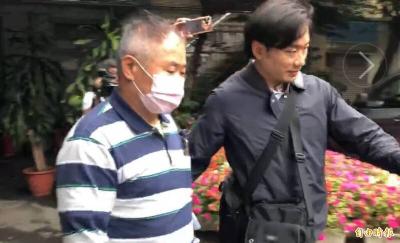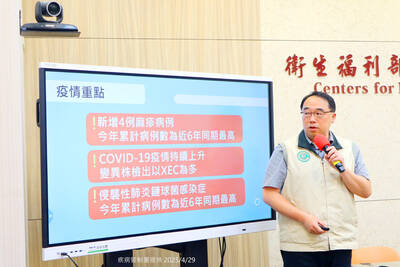Opposition party legislators yesterday urged the DPP administration to allow chipmakers to invest in China.
"Taiwan is in danger of being marginalized on the global economic stage if the government, because of its political concerns, continues to ignore China's growing market," PFP Legislator Pan Chien-kuo (
The lawmakers have just returned from a visit to China to study developments in its technology industry.
"China represents a huge potential consumer market for 3C products," Pan said, referring to the 3C sector of computers, communications, and consumer electronics.
"The fact that Taiwan doesn't make its move [in China] does not mean that other world-class manufacturing plants such as Motorola, Intel and NEC are shy about investing in China," Pan said.
"One strong impression I gathered from the visit was China's determination and pace in developing its information technology, digital content and semiconductor industries," Pan said.
"Taiwan should build on its existing technical advantages and seize the opportunity to grab its share of China's lucrative market before it is too late," Pan said.
Taiwan partially lifted its China ban on local chipmakers last March.
Companies are still restricted to standard 8-inch silicon wafer production and they must invest in more advanced 12-inch wafer technology in Taiwan.
Pan said the "correct way" for the government to salvage Taiwan's economy is to take advantage of China's growing market by lifting restrictions on Taiwan chipmakers such as Taiwan Semiconductor Manufacturing and United Microelectronics Corp.
Echoing Pan's remarks, Lee said, "The government should not be conservative about investing in the Chinese market.
It should help strengthen its position in relation to China to help enhance the competitiveness of all Taiwanese businesses in China."
During their seven-day stay, the group also visited Shanghai-based Semiconductor Manufacturing International and Grace Semiconductor Manufacturing.
The two chip makers were accused by the Ministry of Economic Affairs last month of accepting investmentsvfrom four Taiwanese firms, including two venture capital companies -- Prudence Capital and Global Strategic Investment Fund -- that are managed by former top-ranking government officials Hsu Li-teh (徐立德), a former vice premier under Lee Teng-hui (李登輝), and Yang Shih-chien (楊世緘), vice minister of economic affairs from 1992 to 1993.
The legislators at the press conference clarified on behalf of the two semiconductor firms that all investments in the companies comes from non-Taiwanese sources.
The government strongly forbids Taiwanese investment in China's semiconductor-manufacturing sector.
Also see story:

A fugitive in a suspected cosmetic surgery fraud case today returned to Taiwan from Canada, after being wanted for six years. Internet celebrity Su Chen-tuan (蘇陳端), known as Lady Nai Nai (貴婦奈奈), and her former boyfriend, plastic surgeon Paul Huang (黃博健), allegedly defrauded clients and friends of about NT$1 billion (US$30.66 million). Su was put on a wanted list in 2019 when she lived in Toronto, Canada, after failing to respond to subpoenas and arrest warrants from the Taipei District Prosecutors’ Office. Su arrived at Taiwan Taoyuan International Airport at 5am today on an EVA Air flight accompanied by a

A 79-year-old woman died today after being struck by a train at a level crossing in Taoyuan, police said. The woman, identified by her surname Wang (王), crossed the tracks even though the barriers were down in Jhongli District’s (中壢) Neili (內壢) area, the Taoyuan Branch of the Railway Police Bureau said. Surveillance footage showed that the railway barriers were lowered when Wang entered the crossing, but why she ventured onto the track remains under investigation, the police said. Police said they received a report of an incident at 6:41am involving local train No. 2133 that was heading from Keelung to Chiayi City. Investigators

The Keelung District Prosecutors’ Office today requested that a court detain three individuals, including Keelung Department of Civil Affairs Director Chang Yuan-hsiang (張淵翔), in connection with an investigation into forged signatures used in recall campaigns. Chang is suspected of accessing a household registration system to assist with recall campaigns targeting Democratic Progressive Party (DPP) city councilors Cheng Wen-ting (鄭文婷) and Jiho Chang (張之豪), prosecutors said. Prosecutors yesterday directed investigators to search six locations, including the Chinese Nationalist Party’s (KMT) Keelung office and the residences of several recall campaign leaders. The recall campaign leaders, including Chi Wen-chuan (紀文荃), Yu Cheng-i (游正義) and Hsu Shao-yeh

COVID-19 infections have climbed for three consecutive weeks and are likely to reach another peak between next month and June, the Centers for Disease Control (CDC) said yesterday. Weekly hospital visits for the disease increased by 19 percent from the previous week, CDC Epidemic Intelligence Center Director Guo Hung-wei (郭宏偉) said. From Tuesday last week to yesterday, 21 cases of severe COVID-19 and seven deaths were confirmed, and from Sept. 1 last year to yesterday, there were 600 cases and 129 deaths, he said. From Oct. 1 last year to yesterday, 95.9 percent of the severe cases and 96.7 percent of the deaths